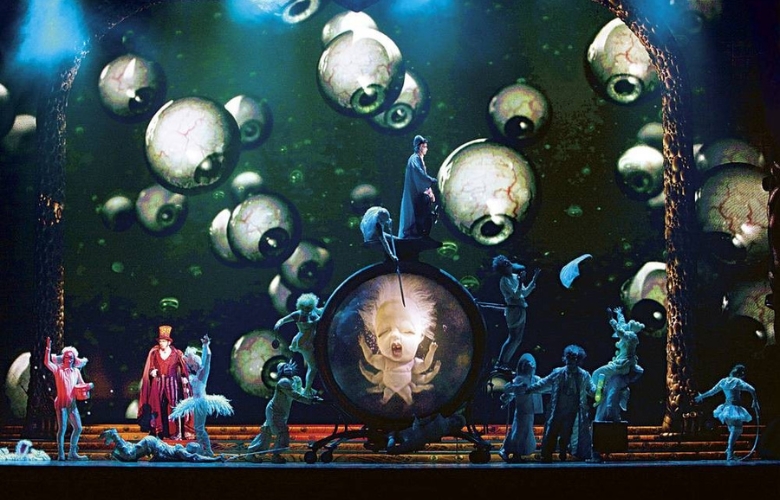
In this week’s edition, my dear friend and colleague, Niko Lambros Smith, writes about what approaches have allowed him to make genuine connections with individual people and how that contributes to team building, especially on large-scale productions. It’s amazing how small gestures promote a sense of belonging and commitment to working together. I hope you enjoy it!
In a previous edition of Half-Hour, Bryan Runion wrote about the distinctions and similarities between the words Authority, Power, and Leadership. In that newsletter, Bryan mentioned that all of the concepts are somewhat tied together and in service of the latter – leadership. As I began my journey into the field of Stage Management, I struggled a lot with these three concepts. Over the years, as I have worked with many different teams, I have discovered that this is not an uncommon trait. I think that many young Stage Managers have found themselves in the field because of what they perceived to be power tied to the position – particularly those coming out of high school theater programs where being the Stage Manager often meant being the true second-in-command to their directors. It is tempting to view stage management as a position of power; however, as I have developed my own personal philosophy on the field, I have found myself much more comfortable treating the role as a position of service. And like any service position, there is one trait that can really set us apart as Stage Managers: kindness.
The introduction of the Wikipedia article for Kindness gives a thorough definition of the word: Kindness is a type of behavior marked by acts of generosity, consideration, rendering assistance, or concern for others, without expecting praise or reward in return.
As leaders, approaching our work with this as a guiding value can really help us to influence morale and help to combat some of the colder aspects of working in the world of entertainment.
Over the years, working with so many collaborators, I have learned that the ones who have left a lasting impression on me were the ones who embodied this word.
Many years ago, while working on the Cirque du Soleil show Zarkana in Las Vegas, I encountered a manager who would leave precisely that kind of lasting impression on me. John Juliano was the Assistant Head of Carpentry for the show – meaning he wasn’t even my direct supervisor in any way. However, within my first few weeks of starting at the show, I began to notice that John would always greet me by name. It was particularly noticeable because we were quite a large production, with more than 80 artists and over 150 staff and technicians… even within my department, it took quite a while for my own teammates to remember my name. But every day that I passed John in the hallway, he greeted me with a smile and by name, and soon he found opportunities – waiting for an elevator together, in line at the Employee Dining Room, etc. – to ask me questions about my life outside of the show. And then… he remembered those details.
John was invested in building a personal relationship with me, and I noticed that he did the same for everyone else in the building. Six months after Zarkana closed, I joined Cirque du Soleil’s Kà at the MGM Grand Resort, where I was surprised to bump into John again. He had become the Production Manager at the resort, so while we weren’t working closely together, we were still connected. When we met again during my onboarding, John greeted me with a big hug and asked for updates on my life since we had last seen each other. It is no surprise to me that John is now a Director of Entertainment for MGM Resorts International, overseeing the entertainment operations at the MGM Grand and New York, New York resorts in Las Vegas. Of course, John has many skills that propelled him to this role, but the one that I will always remember him for is his kindness.
I left Kà in 2017 to pursue graduate study in Stage Management at UC San Diego. During one of our first classes, we were asked to speak about someone we had worked with that demonstrated skills that we admired. Immediately, I thought of John. As part of the same class, we developed practices that we would like to incorporate into our own work. My very first goal in Grad School was to learn the names of everyone working on my shows and to use those names as a sign of respect whenever I encountered them. Little did I know this small step would be transformative to my work as a Stage Manager. I have learned that this small investment of time has led to many rewarding relationships with people from every department on every show I have worked on since. What I learned from John was to approach my collaborators with genuine empathy and to find joy in taking an interest in their lives. Over the years since I first adopted that practice, I have added to it to also find time to speak to each of my collaborators and learn more about their stories. This kind of consideration goes far in bringing people together, and I have seen how it can improve communication between teams and departments.
Over the last decade, there has been much discussion about what the role of the Stage Manager requires. Are we leaders? Are we artists? Do we just enforce the rules? I’m sure many would recognize the stereotype of the SM as a no-nonsense rule-monger who is too busy for anyone to talk to them. I’ve certainly encountered Stage Managers who fit this type, often the kind to have coffee mugs with phrases like “Actor’s Tears” at their desk. One Stage Manager I worked with had a sign that said, “Let me pour you a tall glass of Get Over It, oh and here’s a straw so you can suck it up,” posted on the wall in our shared office. While our role can sometimes have an overwhelming amount of responsibility, it always hurts me to see this kind of resistance to connection with our coworkers. Our role requires so much concentration it can be easy to neglect our interpersonal skills. I’ve seen teams that have fallen apart because of that neglect and felt the ripples of that fallout influence the morale of the rest of the show. As the central hub of information and communication on productions, we have the ability to influence the environment more than any other single team. By sending the message that we truly care about everyone we work with, we can boost morale in a meaningful way. In this way, kindness can become a sort of superpower.
As Bryan mentioned in his article, there are different types of authority: Formal (the kind that is given by a title or position) and Informal (the kind that is earned). As Stage Managers, we often find ourselves in a position somewhere between the two. By leading with kindness, we can boost our informal authority with our coworkers and collaborators. This leads to stronger bonds of trust, which only further contributes to better communication and higher morale. The most successful SM teams I have ever worked with have been those who embraced the values of kindness and empathy, investing those into their relationships with artists, technicians, and staff. By being generous with our time and listening skills, considerate of our coworkers, and demonstrative of concern for others, we can help to make a major difference in our field.
Also by Bryan Runion:
Leading From Your ‘Why’ Can Change Everything
Inviting Feedback, Encouraging Diversity and Challenging Tradition


Bryan Runion is a professional Production Stage Manager whose credits include: Drawn to Life (Cirque du Soleil and Disney), Netflix’s Stranger Things: The Experience, Duel Reality (7 Fingers), La Perle (Dragone), The Voice of Tolerance (The Ministry of Education, UAE); Mastercard Experiences (Mastercard); Everybody Black (World Premiere), Queens (La Jolla Playhouse), Ken Ludwig’s The Gods of Comedy (The Old Globe), TEDx (Chula Vista), Mark Morris Dance Company, Joey Alexander Trio, Ukulele Orchestra of Great Britain (La Jolla Music Society), The Bridges of Madison County (Arkansas Rep). Bryan earn his M.F.A. at The University of California, San Diego and his B.A. at The University of Arkansas at Little Rock. He is a proud member of Actors’ Equity Association and The Stage Managers’ Association.
Read Full Profile© 2021 TheatreArtLife. All rights reserved.

Thank you so much for reading, but you have now reached your free article limit for this month.
Our contributors are currently writing more articles for you to enjoy.
To keep reading, all you have to do is become a subscriber and then you can read unlimited articles anytime.
Your investment will help us continue to ignite connections across the globe in live entertainment and build this community for industry professionals.